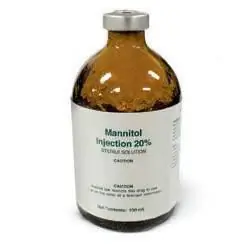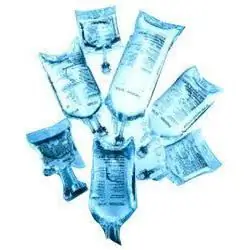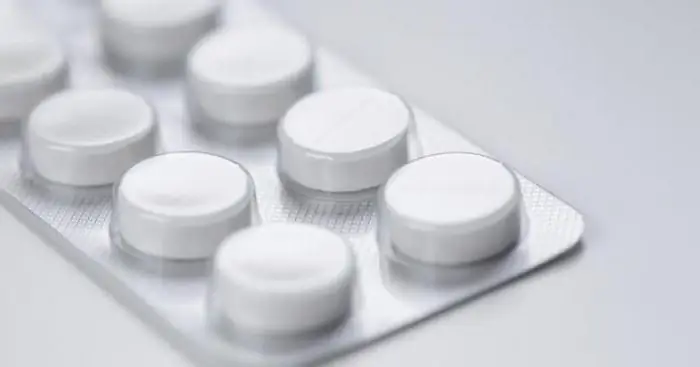- Author Curtis Blomfield blomfield@medicinehelpful.com.
- Public 2023-12-16 20:44.
- Last modified 2025-01-23 17:01.
Many are wondering: "Diuretic - what is it?" This article will talk about what it is and what it is used for.
Pharmacology of drugs
An osmotic diuretic is a drug that draws water from swollen tissues. Thus, it increases the amount of urine and removes excess fluid from the body. This improves blood flow to the kidneys, which in turn increases their functionality. The kidneys at the same time begin to work better and filter. It increases plasma osmolality and moves fluid from organs and tissues (brain, eyeball) into the vascular bed. In this case, together with the liquid, chlorine, sodium and potassium are removed. The last element is withdrawn in small quantities, which does not lead to significant losses.

Pharmacokinetics of drugs
Osmotic diuretic is metabolized (minor) in the liver. In this case, the formation of glycogen occurs. Excretion from the body occurs after filtration (glomerular) through the kidneys. Reabsorption is tubular at the same time insignificant.
Indications for the use of drugs
The action of osmotic diuretics is indispensable duringcerebral edema, intracranial and intraocular hypertension, as well as during acute glaucoma attacks.
Medicines of this group are used for oliguria in acute renal failure. In this case, an osmotic diuretic is used when an increase in diuresis is required. Such tools can only be used with the ability to filter preserved.
They should also be taken for poisoning with lithium, bromides, salicylates and barbiturates.
Osmotic diuretics are drugs that are suitable for use after the introduction of blood that turned out to be incompatible, during the development of post-transfusion complications.
In most cases, they are used during certain surgical procedures such as bypass surgery and extracorporeal circulation surgeries.
In case of shock, burns, sepsis and peritonitis, diuretics contribute to improved removal of toxic substances from the body. They lower blood pressure.

Contraindications for use
Osmotic diuretic should not be used for:
- Chronic kidney failure.
- Impaired filtration capacity of the kidneys.
- Left ventricular failure and pulmonary edema.
- Hemorrhagic stroke.
- Subarachnoid hemorrhage.
- Severe dehydration.
Drugs should not be taken without a doctor's prescription. Their use unnecessarilycan lead to serious consequences.

Side effects
During the use of drugs, some side effects may occur that can cause discomfort to a person.
These include:
- Headaches.
- Nausea and vomiting.
- Hemorrhages and tissue death when products get under the skin.
- There may be a ricochet effect.
- Possible increase in nitrogen (residual) in the blood.
Usually, if you experience these side effects, you should stop taking your medications and see your doctor right away. He will adjust the dosage or replace the remedy with a similar one.

What drugs are osmotic diuretics?
The most popular remedy is "Mannitol". Instructions for use will allow you to familiarize yourself with its features in detail.
Also this group of drugs includes:
- "Torasemide".
- "Bumetanide".
- Xipamide.
- Chlorthalidone.
- "Politiazit".
This is an incomplete list of medicines that will help with swelling and other diseases. They should not be used without the permission of a doctor, just like Mannitol. The instructions for use will not give you guarantees that you have correctly selected and calculated the dosage.

Comparative characteristics
"Mannitol" is used more often than other drugs due to the fact thatwhich acts stronger and longer, and also it does not increase the content of nitrogen in the residual form in the blood. At the same time, urea penetrates better and deeper into organs and tissues. This can cause brain hydration and increase intracranial pressure 6-7 hours after intravenous administration.
Potassium-sparing diuretics
Osmotic potassium-sparing diuretics do not remove potassium from the body, unlike simple osmotic diuretics. Drugs belonging to this group have a positive effect on the heart muscle, but have one minus in comparison with drugs that remove potassium. It lies in the fact that their action is a little slower, and it begins only on the second or third day after application. At the same time, their effect lasts longer.
Potassium-sparing diuretics doctors recommend using in combination with other diuretics. Their single use for removing edema is undesirable, as they have a weak effect.
They are forbidden to be used if a person has cirrhosis of the liver, renal failure in acute and chronic form, hyponatremia and hyperkalemia.
Medications that belong to this group are allowed only on prescription.

Use of diuretics during pregnancy
Use osmotic diuretics only when the benefit to the mother outweighs the risk to the fetus. The decision on the appointment is made by the doctor after examinations and tests.
Overdose
If the administered dose exceeds the norm, then hypervolemia may develop, intracranial pressure increase and electrolyte-water balance may be disturbed. It is also possible to increase the fluid outside the cells. If the dosage was exceeded greatly, then the load on the heart will increase. People with diseases of this organ can develop severe complications that require immediate medical attention.
So, a diuretic - what is it? Now, after reading this material, many know the answer to this question. This group of drugs includes diuretics, which are used for cerebral edema, burns, sepsis and many other diseases. Due to their action, they improve the outflow of fluid in the urine and blood circulation in the kidneys. This contributes to their better filtration. Taking drugs of this group is allowed only on prescription, because only he will calculate the correct dose for you and check for contraindications. It is quite difficult to do this on your own, and sometimes even impossible.
Be he althy!






